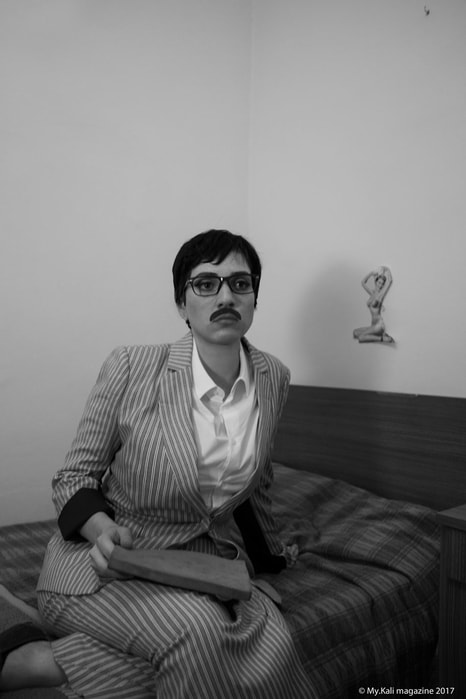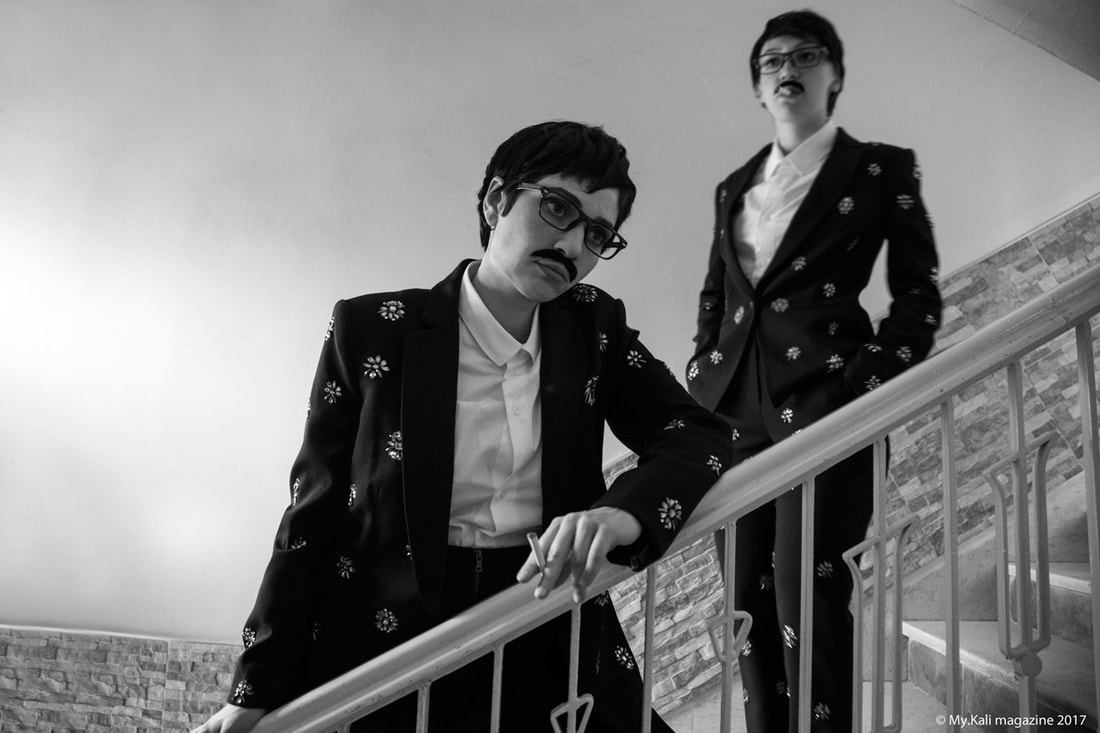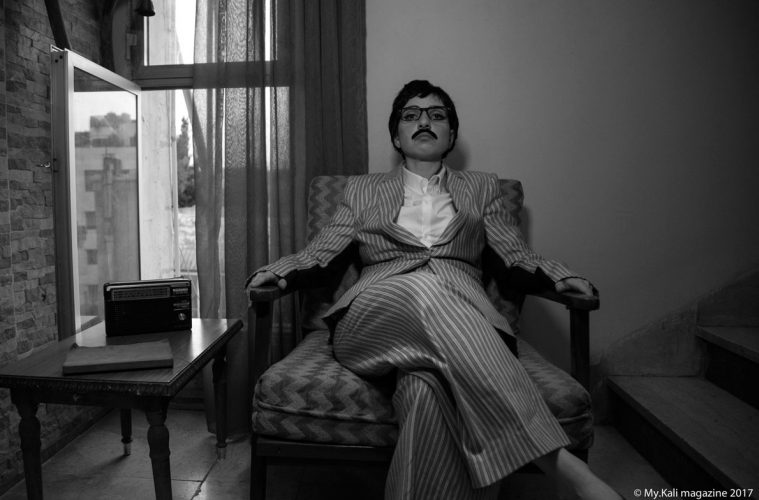المقال بالعربي هنا
Jordanian Actress Shereen Zoumot confronts gender barriers through her on-stage feminism
By Olivia Cuthbert
Photographed by D.H.
Styled-designed by Fadi Zumot
Make-up by Yara Shawabkeh
Hair by Atef from Franck Provost – Amman
Creative directed by Khalid Abdel-Hadi
Model (portraying Nadia Lutfi): Marwa Tarawneh
Amman – Jordan
Thanks to H&M for granting My.Kali some of their Beauty/Make-up products.
It’s not often that people get to meet their idols but Jordanian actress Shereen Zoumot is lucky. Last year she was in London, working as associate director on the play Queens of Syria, a performance by 13 refugee women that caused a stir on stages across the UK. The opening night, at London’s famous Young Vic theatre, drew a mixed crowd of activists, theatre enthusiasts and even a few celebrities, including Australian actress Cate Blanchett, the woman who inspired Zoumot to pursue a career in acting. “I first saw her in Paradise Road when I was in my early teens and realized then that I wanted to be an actress like her, not just because she’s talented but because she’s also an ambassador for human rights,” says Zoumot.
Born in Amman to a middle-class family, the 31-year-old actress was not always the outspoken performer she is today. “As a child I had a stutter and lacked self-confidence but drama cured me of these things,” she says. Acting was also the solace she sought as a young teenager when troubles at home upset her family life. “I was spending most of my time alone but there was this drama teacher at school who became like an older sister to me and was a huge source of inspiration.” Being part of the theatre crowd at school also gave Zoumot a sense of belonging and she began to gain the confidence she now displays on stage.
The roles she seeks out combine her parallel passions for theatre and feminism, using the stage as an arena to advocate for women’s rights and address issues such as sexual harassment and female freedom. “I’m neither an activist first nor an actress. My message is ultimately about theatre and feminism together,” says Zoumot, gesturing towards the varied body of films and plays she has written, acted in and produced. One of her most significant roles to date came in 2013 when she was cast alongside renowned Jordanian actress Juliet Awad in Not Another Word, a short film by director Cherien Dabis.
Zoumot plays Lama, a free-spirited girl facing family pressure to accept a marriage proposal she doesn’t want. The story explores the conflicting values of three generations of Jordanian women as they debate their roles and responsibilities in a patriarchal society. The script resonated with Zoumot’s own experiences as a girl growing up in Jordan and her frustration at the social restrictions faced by women in countries across the region. “Even in modern families, women in their twenties and thirties still face enormous pressure to be married. There’s this ongoing sense that a woman needs a man to protect her and secure her future,” she says.
For Zoumot, acting has always been a means of addressing taboo subjects and confronting social norms she found stifling and oppressive. Growing up, she enjoyed playing football with her male cousins. “As a child I always wanted to be a boy and do things boys can do. I wanted to scream and shout and play football and get dirty” she says. “Before we hit puberty there was no difference but it broke my heart when I grew older and realized I couldn’t play with my cousins in the same way.” As a teenager, she sought out acting roles where she could play men and challenge the gendered expectations she came up against off stage. “Then I thought, why do I have to act like a man and have masculine privileges to do the things I want? Why can’t I be a woman and achieve?”

On Shereen; white shirt, H&M. Full suit, BCBG Max Azria.
This is a theme she has revisited in this issue’s photoshoot, which celebrates a more fluid interpretation of gender in its reimagining of scenes from the 1964 Egyptian cinema classic For Men Only. Zoumot is cast variously as Elham (played by Soad Hosni in the film) and Salwa (played by Nadi Lutfi), two female engineers employed by an oil company in Cairo. Prevented from working at new oil wells in the desert due to their gender, the two women dress as men and head out to the oil wells to work alongside their male colleagues in disguise. “To me, this piece is all about empowerment versus conforming,” says Zoumot: “Why do woman have to conform to certain expectations to get what we want?” She identifies with the spirit of resistance embodied by the female leads in the film. “Resistance can take many forms and they do what’s necessary to achieve their aims and I agree with that. I dislike the idea that women have to be saints to get what they want because the world isn’t like this.”
Zoumot is increasingly drawn to theatre over other forms of acting, cherishing the opportunity it gives her to openly address controversial issues and engage her audience in the here and now. “Theatre is limitless. It gives me space to explore different constructions of gender and show that this shouldn’t be a source of confinement for people.” More than film, she feels theatre is “pure interaction” with the scope to be “much more powerful and impactful.” Last year she was involved in a project with Haya Cultural Centre called Pink and Blue, a production aimed at six to 14-year-olds designed to confront the gender stereotypes between siblings and challenge the idea that boys and girls have specific spheres of activity and influence. After the performance, a teenage member of the audience sought Zumot out on Facebook to ask advice in persuading her family to allow her to work.
Incidences such as this reinforce Zumot’s conviction in the capacity of theatre to introduce different ways of thinking and inspire progress. “Theatre is a great way to raise awareness and reach out to the public. It can be really effective, particularly in the teen years,” Zoumot says, recalling her own awakening on stage. She has mixed feelings about its impact in Jordan, where, on the one hand, the space for dramatic arts is limited by lack of funding, a degree of censorship and small audiences that tend to feature the same faces from one performance to the next. Yet the talent is there, she says: “Theatre is often used as a medium for addressing issues in Jordan and there are some great acting groups out there doing really interesting stuff that tackles some of our most pressing social and economic issues.”
However, Jordanians as a whole have little appetite for theatre, which in turn tends to target an elite audience of educated enthusiasts, she says. “It’s rarely addressed to the whole public. The performances cater to people who are highly educated and have money so it’s always the same circle attending.” Inevitably, this inhibits the scope of theatrical performances to have a widespread impact but Zoumot believes the potential is there for drama to be more influential in the future. “We need more support. Initiatives like Amman Design Week patronize art and design but theatre doesn’t have this. People don’t see it as a priority yet.”
Funding is a major issue, she continues, not least because the backing that is available often comes from NGOs, which apply their own layer of conditions. “There’s a lot of censorship in theatre here nowadays and if you want funding you often have to tailor the script to suit the donor’s requirements,” she says. Many performances are also held in small venues for a select guest list. “They are usually chamber performances on an invitation-only basis so it’s not open to the wider public. This is how theatre is confined.”
Nevertheless, theatre in Jordan is evolving as more and more young people take an interest in acting. Zoumot was among the first year groups to enrol in the Acting and Directing course introduced by the University of Jordan in 2004. It took her six years to complete the course because she was frequently abroad, working with international acting groups in Italy, Egypt, Sweden and elsewhere to explore different styles of acting and learn with a multicultural community. In 2007, she worked with an Italian group that used martial arts to train actors. “It was very tough but they had a lot of influence on the way I see theatre now. It was a real turning point for me.”
In Jordan, she has channelled these experiences into her work with local theatrical heavyweights, including director Samar Dudin in the play Kanz, actress Juliet Awad for the film Not Another Word and theatre-maker and performer Lana Nasser, with whom she co-founded feminist theatrical group Aat. “I remember the day I got the email from Lana Nasser inviting me to collaborate. I was so excited,” Zoumot recalls. Just 23 at the time, she had recently completed her graduate play, an adaptation of three short stories exploring the lives of several women denied the space to pursue their talents and dreams in a society governed by the fear of stigma.

Top images: On Shereen; Dress designed by Fadi Zumot. Clutch, earrings, tiara and heels by BCBG Max Azria. On Marwa; Dress designed by Fadi Zumot. Clutch and heels by BCBG Max Azria. Gloves Stylist’s own. Image below, On Shereen; white shirt, H&M. Be-jeweled suit, BCBG Max Azria. On Marwa; white shirt, H&M. Be-jeweled suit, BCBG Max Azria.
“I met Lana in a café and she told me my graduate play has inspired her. We met again as a group at her house and brainstormed our ideas. I’ve known since then that this is my calling – theatre and feminism.” Zoumot worked with Aat for four years, co-organizing exhibitions and an annual feminist theatre festival, the first of its kind in Jordan, as well as producing and acting in various performances. This ranged from adaptations of well-known international productions, including a translation of Sarah Kane’s Crave, as well as works inspired by local stories of life in Amman.
Storytelling has played a larger role in her more recent works too, several of which have focused on displacement and the effect it has on women. In one project with UNRWA, the United Nations Relief and Works Agency for Palestine Refugees, Zoumot interviewed twelve Palestinian women for a production entitled In Their Own Words, performed on International Women’s Day in 2015. She is now busy finalizing her scripts and preparing for several new performances, one of which will take place in Tunisia and focuses on a collection of stories showcasing human rights issues. She has also secured funding from FRIDA to produce a monodrama based on the stories of young Jordanian women.
“I’ve been working towards this project for five years so I’m really excited it’s finally happening.” The stories, composed by Zoumot but based on real-life accounts, explore the gender stereotypes and perceived sexual norms imposed by society, while challenging the patriarchal structure that holds them in place. She anticipates that this will be one of the defining moments of her theatrical career, following on from the whirlwind success of the UK tour for Queens of Syria in 2015. The play, which featured 13 Syrian women, all of them refugees with no background in professional acting, was performed 17 times on stages up and down the country and met with widespread critical acclaim.
“It was always a full house”, recalls Zoumot, describing Queens of Syria as one of the most powerful productions she has participated in. “The women wrote their own stories and it was beautiful because they portrayed their strength on stage. They decided they didn’t want to be seen as victims anymore.” In the play, each woman recounts experiences they have endured and survived, coupled with recollections of the life they miss in Syria and their determination to have their stories heard. “It affected a lot of audiences because it changed the way people saw Syrian refugees and stripped away the stereotypes,” she adds.
For Zoumot, it was also a chance to spend time in the UK, where she hopes to pursue her Master’s degree in theatre and performance. over the coming years. “I want to go abroad to build my career as there’s not much here for me at the moment,” she says, adding that she hopes this will change in the future. “I love Jordan and will always come back here. I’m Jordanian and I’m an Arab, those are my roots and I will never turn my back on them.”
Check the rest of Shereen’s photo-story ‘For Men Only’ here
Check our the shoot ‘Men Only References’ references (Arabic) here

